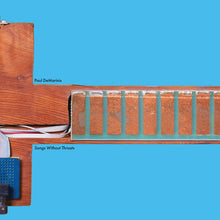Black Truffle / Australia / 2019 / 2LP
Paul DeMarinis is a key figure in the history of electronic music since the 1970s. Collaborator with the likes of Robert Ashley, David Behrman, and David Tudor, DeMarinis is a pioneer in the development of gallery sound installation and digital music technologies. Black Truffle is thrilled to announce the release of a double-LP collection, selected in collaboration with the artist, focussing on DeMarinis’s exploration of synthesized voice and the digital analysis and manipulation of speech sounds. Drawing together tracks dispersed on compilations along with a number of pieces previously unheard in any form, Songs Without Throats offers a revelatory look into DeMarinis’s alternately accessible and uncompromising production between 1978 and 1995.
Opening with a mesmerizing piece from 1978 pairing the voice and tamboura playing of Anne Klingensmith with strings of letters spat out by a Speak n’ Spell to the accompaniment of the randomised melodic patterns of DeMarinis’s homebuilt electronic instrument ‘The Pygmy Gamelan’, the record then dispenses with the live human voice in favour of its recorded and synthetic doubles. We follow DeMarinis’s restless probing of the possibilities of new technologies, from the hacked Speak n’ Spell (which gives us the austere ‘Et Tu, Klaatu’ 1979, another duet with Klingensmith, this time on bowed psaltery, in which the toy’s synthetic voice is stretched into an alien song) through to the use of digital audio samples manipulated with home computer technology in the early 1990s (including a remarkable dream-like collage piece that weaves a rare recording of Stalin’s voice and bird-like electronic twittering derived from its formant-glides into a rich tapestry of samples reflective of the dictator’s musical life). In between we get a rich sampling of DeMarinis’s signature work with speech melodies – usually unnoticed melodic inflections that lie within speech patterns – which he analyses and translates into synthesized musical accompaniment.
These pieces draw on a wide variety of textual and vocal sources, which range from the hilarious to the menacing (‘Cincinatti [1830-1850]’ sets a detailed description of butchering techniques, for example) and an equally broad range of musical conceptions, combining elements as seemingly unlikely as Beethoven’s Opus 31 pianos sonatas and the sounds of 80s synth pop. The results are an extraordinary combination of the alien and the familiar. As DeMarinis himself characterises his work with vocal synthesis, this is ‘a kind of signal that simultaneously carried and obscured meaning and ideation, even as it created a sound world totally alien in esthetic’.




